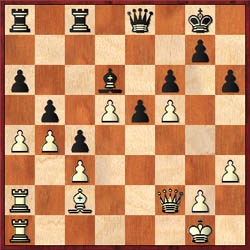 |
 |
 |
 |
 |
 |
 |
 |
 |
 |
 |
 |
 |
 |
 |
 |
 |
 |
 |
 |
 |
 |
 |
|
|
|
|
|
|
|
|
|
|
|
|
|
|
|
|
|
|
|
|
|
|
|
|
 |
|
|
|
|
|
|
|
|
|
|

|
|

|
|

|
|

|
|
|
|
|
|
|
|
|
After receiving a review copy of "Game Over: Kasparov and Machine," from Think Film, Inc., I reflected on Garry Kasparov's recent announcement that he was retiring from professional chess. His presence in the chess world has catapulted him to legendary status and he has held the #1 position for the past twenty years.
Capping off his magnificent career was a win at the "SuperGM" Linares tournament (despite losing his final game to Bulgarian GM Veselin Topalov). His announcement was a shock to the entire chess world which stood in the throes of a unification effort. So… Kasparov has declared that he has nothing to prove in chess… or does he?
In the 2004 documentary of the 1997 match against Deep Blue, producer Vikram Jayanti captured the intensity of the match with an array of camera angles and a dramatic music score more commonly featured in psycho thrillers. The setting of the film was based on a fierce clash of powerful forces: a team of IBM scientists unleashing a "silicon Frankenstein" to destroy Kasparov, the defender of human honor.
|
|
|
|
|
|
|
|
.jpg)
|
|
|
|
|
|
|
|
|
|
|
|
|
|
|
|
|
The film described the evolution of Deep Blue which was conceived in 1989 as an experiment. It ultimately became a project of magnanimous importance. The silicon beast boasted 200 parallel processors specifically wired for calculating chess positions. Kasparov had thrashed an earlier version of the program called "Deep Thought" by a score of 4-2, so the stakes were high. However, the first controversy of the match centered around IBM's refusal to make a database of games available for the Kasparov team. Immediately the match turned from "friendly" to "contentious." The movie skillfully painted an aura of mystique over Deep Blue reminiscent of HAL in the movie, "2001: A Space Odyssey."
Intermittent images of "The Turk" automaton flashed across the screen. The Turk become a famous 18th century sideshow when beating all comers (including Napoleon). It was later discovered that the contraption had a strong human player in a hidden compartment and was finally accepted to be a grand hoax. The analogy would make more sense after Kasparov sensed that Deep Blue may have received some help in the second game of the match… especially since the program entered a variation that gave Kasparov chances for a draw. How could this powerful machine miss this?
|
|
|
|
|
|
|
|
|
|
|
|
|
In the post-game interview, Kasparov made a veiled accusation of cheating by stating that the machine played "different." He later made an analogy to Diego Maradona's famous illegal "Hand of God" goal in the 1986 World Cup soccer tournament. Those close to the situation (including Yasser Seirawan) stated that something strange was happening.
Kasparov demanded to see the computer logs of the machine; he claimed that he was flatly denied. This was a pivotal point of the match that had a tremendous psychological effect on Kasparov. In the movie, it was apparent that he was still occupied with game two.
The next three games were brutally contested, but ended in draws. Kasparov would later reveal that he had lost all desire to play and lost the 6th and final game to an elementary opening trap. After the match ended (3½-2½) in favor of Deep Blue, the post-match interview was less than cordial.
|
|
|
|
|
|
|
|

|
|
|
|
|
|
|
|
|
|
In game two, Deep Blue played the "human-like" 36.axb5 axb5 37.Be4! Instead of the "computeresque" material-grabbing 36.Qb6. It was at this point that Kasparov became suspicious.
|
|
|
|
|
|
|
|
|
|
|
|
|
|
|
|
After Kasparov bluntly lambasted the tactics of the Deep Blue team, he immediately became the butt of jokes on late night talk shows and political cartoons showing him unable to set VCRs and operate vending machines. The movie did a great job at capturing the intensity of the match and can be enjoyed by non-chessplayers as well. It is with intrigue that many hold these "Man vs. Machine" contests and this movie captured the importance of this battle. The DVD will be available to the public in May 2005 and is certainly worth adding to one's library.
The Chess Drum, "GAME OVER: KASPAROV and THE MACHINE," 26 January 2004.
Jonathan Schaffer and Aske Plaat, "Kasparov vs. Deep Blue: The Rematch," ICCA Journal, Vol. 20, No. 2, 1997, 95-102.
See Deep Blue - Garry Kasparov games
Think Film, Inc.
|
|
|
|
|
|
|
|
|
|
|
|
|
|
|
|
 |
|
|
|
|
|
 |
.jpg)
